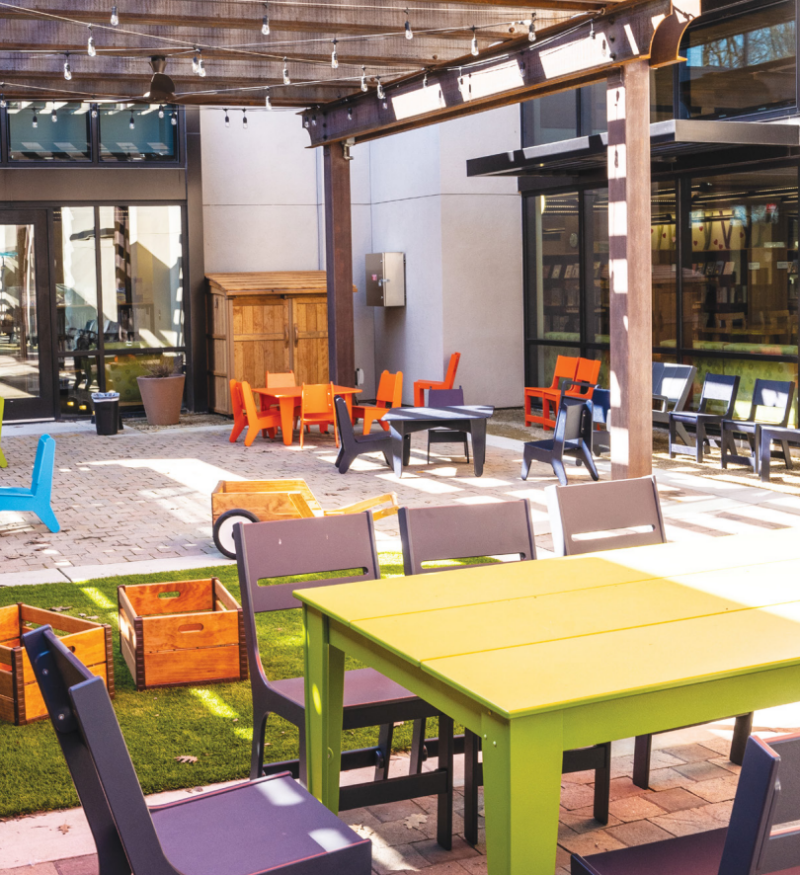Celebrating National Library Week
Read a thousand books, and your words will flow like a river.
– Lisa See
You’ve likely heard the saying “Don’t judge a book by its cover,” but you probably wouldn’t expect that to apply to a library. On the outside, libraries are the places you go to check out books and not much else. Take a closer look and you’ll find that “there’s more to the story,” which is this year’s theme for National Library Week.
These days there aren’t many public spaces that are truly open to everyone. Most places, like malls, coffee shops, and clubs, expect you to purchase something or pay a membership fee in order to spend time there. This is why librarians like Heather Geddes of the Steve Tate Community Library in Morgan Hill thinks libraries are so vital. “Libraries are sort of the great equalizer in that we welcome everyone,” she said, “We provide access to free resources to all of our community members and we tailor what we do to what we see in our community. So we create a space that everyone has access to enjoy.”
Whether you’re a student or freelancer looking for a quiet workspace, an immigrant working on language skills, or homeless and in need of a computer and internet, anyone can benefit from what the library has to offer.

Free space and resources may not seem like much, but it boosts the community in a number of ways, including helping people get to the next step in their careers. Libraries offer free job-hunting assistance and online resume builders, and their dedicated employees are happy to provide extra help if needed. Geddes recounted a story of a woman who wanted to apply for a job that only accepted online applications, but she didn’t have computer skills or access to a computer at home. Employees at the Morgan Hill Library helped her through the application process and two weeks later the woman returned to tell them that she had gotten the job specifically because of their help.
Over the centuries, libraries have constantly changed and adapted in order to ensure that everyone has access to information. “Whether it’s providing access to books, audiobooks, eBooks, CDs, DVDs, tablets, streaming, and social media, we’re always looking to what that new technology is and figuring out how our community can access it,” Geddes said. It’s no surprise then that when the pandemic hit and lockdowns happened, the Gilroy and Morgan Hill libraries were quick to switch from in-person programs to online access and provide pick-up-and-go services for books and materials. “It was really a testament to how flexible our teams are and the work that they do,” Geddes said.
Gilroy Library also found some silver linings during the pandemic. They discovered that their ESL Conversation Clubs, which bring people together to practice speaking English, were popular online during the lockdowns, and so they continued to offer the clubs online (as well as in person), even after it was safe to open up again. They also built an outdoor solar patio to foster more collaboration.
Along with promoting literacy and access to information, both Geddes and Wong see libraries as a catalyst for addressing social issues within their communities. For years, the Gilroy and Morgan Hill libraries have been offering the After School Snack program, where kids under 18 have access to free snacks during the school year, and the Lunch at the Library program during the summer, which offers free meals for kids and their families when school isn’t in session. While children and family members are there they also have the opportunity to participate in enrichment programs like arts and crafts, STEM, or watch presentations that help bridge literacy and educational needs. “We really want to make sure that families are able to enjoy other aspects of our community because they aren’t worried about where a meal might be coming from,” Wong said. And, as Geddes points out, if you’re hungry you’re not able to learn.
read at your grade level will help predict your success in future grades and where you go in life,” Geddes said. The ELR program helps increase those chances of future success. Geddes recalled a mother who approached her a month into the ELR program to tell her that she’d never worked with her son on spelling or reading his name before, and already he was recognizing the letters that spelled his name and trying to write it.